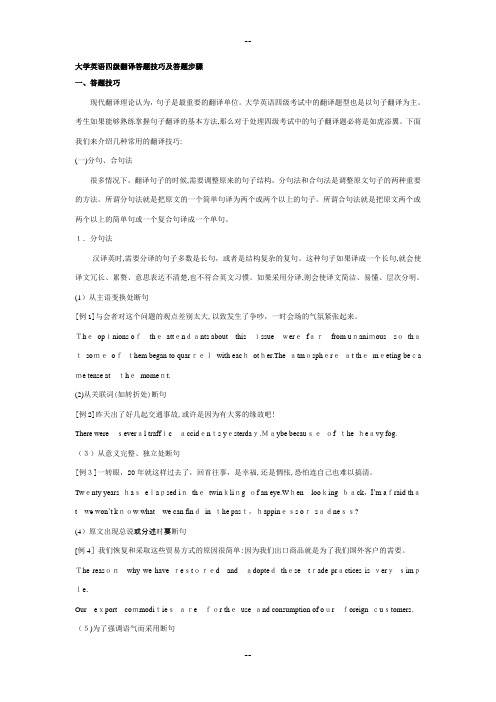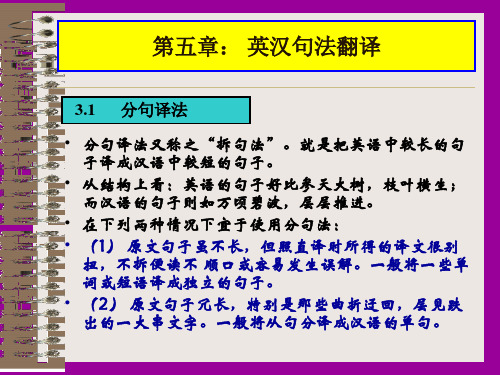英汉翻译(9)分句与合句
大学英语四级翻译答题技巧及答题步骤

大学英语四级翻译答题技巧及答题步骤一、答题技巧现代翻译理论认为,句子是最重要的翻译单位。
大学英语四级考试中的翻译题型也是以句子翻译为主。
考生如果能够熟练掌握句子翻译的基本方法,那么对于处理四级考试中的句子翻译题必将是如虎添翼。
下面我们来介绍几种常用的翻译技巧:(一)分句、合句法很多情况下,翻译句子的时候,需要调整原来的句子结构,分句法和合句法是调整原文句子的两种重要的方法。
所谓分句法就是把原文的一个简单句译为两个或两个以上的句子。
所谓合句法就是把原文两个或两个以上的简单句或一个复合句译成一个单句。
1.分句法汉译英时,需要分译的句子多数是长句,或者是结构复杂的复句。
这种句子如果译成一个长句,就会使译文冗长、累赘、意思表达不清楚,也不符合英文习惯。
如果采用分译,则会使译文简洁、易懂、层次分明。
(1)从主语变换处断句[例1]与会者对这个问题的观点差别太大,以致发生了争吵,一时会场的气氛紧张起来。
Theopinions oftheattendants about thisissuewerefarfrom unanimous sothatsomeofthem began to quarrelwith eachother.The atmosphereat themeeting beca me tense atthemoment.(2)从关联词(如转折处)断句[例2]昨天出了好几起交通事故,或许是因为有大雾的缘故吧!There wereseveral trafficaccidents yesterday.Maybe becauseof the heavy fog.(3)从意义完整、独立处断句[例3]一转眼,20年就这样过去了,回首往事,是幸福,还是惆怅,恐怕连自己也难以搞清。
Twenty years haselapsed inthetwinkling of an eye.When looking back,I’m afraid that we won’t know what we can findin the past,happiness orsadness?(4)原文出现总说或分述时要断句[例4]我们恢复和采取这些贸易方式的原因很简单:因为我们出口商品就是为了我们国外客户的需要。
汉英翻译中的句子结构处理

汉英翻译中的句子结构处理:翻译一个具体句子时,首先必须解决句子结构的问题.在很多情况下,将汉语原文的句子结构不加改变或稍加改变就移植到英译文中去,是完全可能的;但在不少的情况下,则必须改变原文的句子结构。
例如原文的句子很长或由于其他原因,译成英语时就须把它拆开,译成几个句子.如原文是两个或两个以上的句子,但其间的逻辑关系非常紧密,或由于英语本身的原因,又须将它们译为一句。
此外,如为了句子的连贯,为了强调或不强调句子的某一部分;为了传达原文句子的语气,或是由于汉语句子比较特殊(如汉语多无主语句),或是由于英语本身的特点(如被动结构较多)等等,我们都必须改变原文的结构。
改变原文句子结构的方法很多,现将常用的几种列举如下。
一、拆句将原文中的一个句子拆开,译成两个或两个以上的句子,称为拆句翻译法。
1、时候既然是深冬,渐近故乡时,天气又阴晦了,冷风吹进般舱中,呜呜的响。
(鲁迅《故乡》)It was late winter。
As we drew near my former home the day became overcast and a cold wind blew into the cabin of our boat.2、中国两国是近邻,只隔一衣带水,我们两国的关系已有一千多年的历史。
China and Japan are close neighbours separated by just a strip of water 。
The relations between our two countries have a history of more than 1,000 years。
3、健全自己的身体,保持合理的规律生活,这是自我修养的物质基础。
(周恩来《我的修养原则》)Keep fit,lead a reasonable and regular life。
This is the material basis for personal training。
分句、合句法(精)

2)She sat with her hands cupping her chin, staring at a corner of the little kitchen. 译文:她坐在那儿双手拖着下巴,眼睛凝视 着小厨房的一角。 3)Sunrays filtered in wherever they could, driving out darkness and choking the shadows. 译文:阳光射入了它所能透过的所以地方, 赶走了黑暗,驱散了幽影。
3) He had long been held in cordial contempt by his peers; now that contempt was no longer cordial. 译文:长期以来,他的同僚虽然看不起他,却还是 对他有些亲切感,现在,除看不起他之外,亲 切感也没有了。 4) He stalked away, but with a gnawing uncertainty in his breast. 译文:他昂首阔步地走开,心里半信半疑,感到十 分苦恼。
3) As a place to live, it left much to be desired. As a secret training base for a revolutionary new plane, it was an excellent site, its remoteness effectively masking its activity… 译文:作为居住的地方,这里有许多不足之处。但 作为完全新型飞机的秘密训练基地切实非常理 想的。它地处边陲,人们不易了解其中的活 动…… 4) The inside of each tent depended on the personality of its occupants. 译文:每个帐篷内怎样的布置,这要看各个使用者 的性格了。
英译汉常用的方法和技巧

(4)名词 10. She left home a child and came back a mother of three children. 离家时她还是个孩子,回来时已是三个孩子的妈妈了。 11. As a secret training base for a revolutionary new plane, it was an excellent site, its remoteness effectively masking its activity. 作为新型飞机的训练基地,这是一个非常理想的地方;因为它地处边陲,人们不容易了解其中的活动。
I.分译法的使用 A. 单词的分译 将原文中的一个单词分离出来单独译为汉语的一个句子,使原文的一个句子分译成两个以上的汉语单句。可能进行分译的单词有: (1)形容词 3. He is having an identifiable trouble with his teeth. 他正患牙病,这是大家都看得出来的。 4.The day dawned misty and overcast. 那天天亮时雾气很重,天上布满乌云。
பைடு நூலகம்
译文中增补了“我游泳时”,重复了“一大群观众”。
原来的一个英语句子被分译成5个汉语句子,属于长句分译。其中由because of和before引出的两个介词短语以及副词 undeservedly分别转换为汉语单句。
从中可以看出,分译是一个综合性的翻译过程而不是一种单一的翻译方法。它可涉及“增补”、“转换”、“重复”等翻译方法的使用。
第二节:被 动 语 态 的 译 法
I.英语被动语态的用法 英语中被动语态的使用比汉语较为普遍。英语句子在下列情况下一般使用被动语态: A.不必或者无法说明主动者是谁 1.This book has been translated into several foreign language. 该书已经译成了好几种外国语言。 B.谈话的中心是承受者而不是主动者 2. The machine here are all made in China. 这儿的所有机器都是中国制造的。
英汉句法翻译(分句、合句与长句)

3.1 分句译法
• 分句译法又称之“拆句法”。就是把英语中较长的句 子译成汉语中较短的句子。
• 从结构上看:英语的句子好比参天大树,枝叶横生; 而汉语的句子则如万顷碧波,层层推进。
• 在下列两种情况下宜于使用分句法: • (1) 原文句子虽不长,但照直译时所得的译文很别
扭,不拆便读不 顺口或容易发生误解。一般将一些单 词或短语译成独立的句子。 • (2) 原文句子冗长,特别是那些曲折迂回,层见跌 出的一大串文字。一般将从句分译成汉语的单句。
• 4. He shook his head and his eyes were wide, then narrowed in indignation.
• 他摇了摇头,两目睁得圆圆的,接着又眯成一条线,脸 上露出了愤怒的神色。
3.1.2 将词组或短语译成汉语的句子
• 1.I wrote four books in the first three years, a record never touched before.
• 由于受到顽强抵抗,吹嘘能在几个小时内就占领要地的敌人甚 至还没有能占领外围地带,这一事实使我增强了信心。
指代它,与主句的其他 成分连句成文。
got to know the real people of Egypt.
• 英国人在埃及呆了那么多
年,却从来没有真正了解
埃及人,这是异乎寻常的。
4. It’s quite probable that he is gone.(他已经走了,有那一是条很举可世能的公。)
3.3.1 切断法(顺序法)
• 所谓切断法,就是按英语句子的语序把英语长句“化整为零”, 按意群将长句断开译成若干汉语分句。如:
分句、合句法

分句、合句法
一、分句(Division)
• 英语长句较多。句子修饰语多且长,句子 结构复杂;而汉语中长句则相对较少,修 饰语也较少且短。所以英译汉时,不能照 样克隆复制,而是得根据汉语的特点,灵 活处理。分句(切分)就是一种常见的方 法,是指把英语中的长句分译成两个或两 个以上的句子。 • 分句分三类:单词分译、短语分译、句子 分译
2. In the course of my travels in America I have been impressed by a kind of fundamental malaise which seems to me extremely common and which poses difficult problems for the social reformer. 我在美国旅行期间,注意到了一种根深谛固的忧郁症。我觉得这种 忧郁症似乎极其普遍,这给社会改革家出了难题。(在第一个 which引导的从句前切分。) 3.The day of the big snow, when you had to shovel the walk and couldn‘t find your cap and asked me how to wind a towel so that it would stay on your head--- you, in the white towel turban, like a crazy king of the snow. 那天下着大雪,你得去铲除道上的积雪。一时又找不到帽子,就 问我怎样才能把毛巾裹在头上又不让它掉下来。那时的你,头上 裹着白毛巾,简直像一个雪中古怪的国王。(在破折号处切分。)
9_句子的翻译
译成独立句
定语从句较长,与主句关联又不紧密,汉译 时就作为独立句放在主句之后。这种译法仍 然是顺序分译法。例如: (1)Friction wears away metal in the moving parts,which shortens their working life. 运动部件间的摩擦力使金属磨损,这就 缩短了运动部件的使用寿命。
2。英语以动词think, suppose, believe, seem, expect, feel, anticipate 等作为谓语且后接不定式短语的否定句中,汉译 时原文中否定谓语动词,译文中否定不定式短语。如: Liquids, except for liquid metal such as mercury, are not considered to be a good conductors of heat. 除了液体金属如水银外,其它液体则被认为是不良导热体。 For many years the atom was not believed to be divisible. 过去多年来原子一直被认为是不可分割的。
(2)Such a slow compression(缓慢压缩) carries the gas through a series of states, each of which is very nearly an equilibrium state(平衡状态) and it is called a quasistatic(准静态) or a“ nearly static” process. 这样的缓慢压缩能使这种气体经历一系 列的状态,但各状态都很接近于平衡状态, 所以叫做准静态过程,或“近似稳定”过程
否定的转移
英汉两种语言在表达否定方面有一定的差异, 有些句子在英语中否定的是主语,而汉译时 则否定谓语;还有一些句子在英语中否定的 是谓语,而译成汉语时却否定了状语,这种 否定转移的现象需要我们特别注意。
合译法和分译法
I’m not the first person who has made mistakes.
• 我不是第一个犯错误的人。 • 犯错误的人多的是,我又不是头一个!
分/拆译法(Division):为了符合汉语表达习惯, 也为了更清楚地表达原 文意思,在翻译时可以改变原文结构,把原文的某个成分从原来的结 构中分离出来,译成一个独立成分、从句或并列分句。 此处所谓的句子不在于结尾处用句号,而在于有无主谓结构。
译成“兼语式”结构
• 把先行词译成身兼两种语法功能的词组,使其前、 后各有一个动词,该词组与前一动词发生动宾关 系,与后一动词发生主谓关系。
• The turbines(涡轮机) drive the dynamos(发电机) which generate the electricity. • 涡轮机带动发电机发电。 • I need someone who can instruct me in my English study. • 我需要一个人来指导我学习英语。 • When I passed by, I saw a man who was quarreling with his wife. • 当我经过时,我看到一个人和他的妻子在吵架。
译成“的”字 结构
与主句合译成 一个句子
译成“兼语式” 结构
译成“谓语”
译成“的”字结构
Our two countries are neighbors whose frie我们两国是友谊长存的友好邻邦。 • He is not the one who will give up easily. • 他不是一个轻易服输的人。 • Pollution is a pressing problem which we must deal with. • 污染是我们必须解决的一个迫切问题。
英语语句翻译方法
英语语句翻译方法英语语句翻译方法有哪些?翻译其实只要掌握了方法并不难,看看下面吧!一、正反、反正表达法i.汉语从反面表达,译文从正面表达例1:他提出的论据相当不充实。
译文:The argument he put forward is pretty thin. (词) 例2:我们确信,年轻一代将不会辜负我们的信任。
译文:We are confident that the younger generation will prove worthy ofour trust. (短语)例3:他七十岁了,可是并不显老。
译文:He was 70, but he carried his years lightly. (句子)II.汉语从正面表达,译文从反面表达例1:他这个人优柔寡断,而且总是反复无常。
译文:He was an indecisive sort of person and always capricious. (词)例2:调查结果清清楚楚地显示病人死于心脏病。
译文:The investigation left no doubt that the patient had died of heartdisease.(短语)例3:这类举动迟早会被人觉察的。
译文:Such actions couldn’t long escape notice. (句子) III.特殊的否认句式例1:有利必有弊。
译文:There is not any advantage without disadvantage. (双重否认)例2:我们在那个城市从未因为是犹太人而遭受歧视。
译文:In that city, we had never suffereddiscrimination because we wereJews. (否认转移)二、分句、合句法I.分句法汉译英时,需要分译的句子多数是长句,或者是构造复杂的复句。
这种句子如果译成一个长句,就会使译文冗长、累赘、意思表达不清楚,也不符合英文习惯。
英汉翻译---分句、合句法
英汉翻译---分句、合句法
定义
▪ 分句法---把原文的一个简单句译成两个或
两个以上的句子。
darkness and choking the shadows. 译文:阳光射入了它所能透过的所以地方,赶走了黑暗,驱
散了幽影。
4)He was lying on his side watching her. 译文:他侧身躺着。双目凝视着她。
5)But they had become nomads of the desert, living on the ground and under the sky, and they loved it .
Pisa. This city is in the north of Italy near the sea. 译文:他的父亲在意大利北部近海的比萨开小铺。
译文:他真愿那时候已在家里。要是在往常 的日子里,他早已到家三小时了。
5) Illogically, she had expected some kind of miracle solution.
译文:她满想会有某种奇迹般的解决办法。这是不 合情理的事。
6) But, occasionally, through haste or carelessness, mistakes were made, so that at the end of the business day one teller would be short on cash, the other long.
- 1、下载文档前请自行甄别文档内容的完整性,平台不提供额外的编辑、内容补充、找答案等附加服务。
- 2、"仅部分预览"的文档,不可在线预览部分如存在完整性等问题,可反馈申请退款(可完整预览的文档不适用该条件!)。
- 3、如文档侵犯您的权益,请联系客服反馈,我们会尽快为您处理(人工客服工作时间:9:00-18:30)。
5) Chairman Mao might have spoken with understandable pride of his policy of "self-reliance". 毛主席在谈到他的“自力更生”的政策时,也许有 些自豪感,这是可以理解的。 6) That region was the most identifiable trouble spot. 那地区是个麻烦的地方,这是大家最容易看得出来 的。
6. Propositional Phrases
1) She treated that lady with every demonstration of cool respect, ... 她对那位夫人不冷不热,不错规矩。 2) It was at a banquet in London in honour of one of the two or three conspicuously illustrious English military names of this generation. 事情发生在伦敦的一次宴会上。这次宴会是为当代英国声名显赫的两三 位军官将领之一举行的。 3) Then she turned round and took a long mournful look at grandma's blackness and at Fenella's black coat and skirt, and hat with a crape rose. 然后她转过身来,用一种衰伤的目光长久地看着老太太,她身着黑服; 有看着范尼娜,她穿着黑色的短大衣,黑色裙子,戴着一顶黑帽子,上 面还有一朵用黑纱扎成的玫瑰花。 4) But then he was wonderfully good-looking, with his brown hair, his clear-cut face, and his grey eyes. 但另一方面,他却是长得特别漂亮,头发是棕黄色的,脸很清秀,眼睛 是灰色的。
4. Participle Phrases
1) I saw the vague figures of the watch grouped in the waist, gazing in awed silence. 我看到值班水手模模糊糊的的身影一起挤到了中部甲板上,他们都惊得 目瞪口呆。 2) I had others excited by what I saw and yet feeling like a souvenirhunter—— I decided to write. 我有别的想法。我为所见的一切而激动,同时也不无留此存照的想法— —我决定搞写作。 3) We drove to the south of France, taking turns with the driving. 我们驾车到法国南部去,途中轮流开车。 4) Everything around him was full of her presence, continually reopening the wound. 她的身影依然无处不在,时时都触痛着旧日的创伤。 5) They were at home in the home of the people, making confidently without fear. 他们在群众家里感到很自在,行动时心里踏实,无忧无虑。 6) She sat with her hands cupping her chin, staring at a corner of the little kitchen. 她坐在那儿双手托着下巴,眼睛凝视着小厨房的一角。
2.Adverbs
1) Those who judged of his ultimate success by the failure of his first attempt were agreeably disappointed. 那些从他初次尝试遭到失败便断定他的最后结局的人,现在 虽然感到失望,还是高兴的。 2) Their relations were vinegar, although Mr Johnson when speaking of Mr Clark in his absence was acidly correct. 他们之间的关系挺别扭,虽然约翰逊先生在背后谈起克拉克 先生时语中带刺,但还不失分寸。 3) It seemed to him unquestionable that fortunately he had been permitted to look upon one of the world's really great men. 他觉得自己得以瞻仰了一位世界上真正伟大的人物,确是三 生有幸。 4) It may conceivably knock the British empire to bits and leave England as primitive as she was when Julius Caeser landed in Kent. 可以想象,这样的战争会使大英帝国土崩瓦解,使英国回到 朱利叶斯·凯撒在肯特登陆时那副原始模样去。
3. Nouns
1) Yet he knew that that boy of fifteen months before had something, a trust, warmth that was gone forever. 然而,他知道,一年零三个月前的那个小伙子曾有一种宝贵的东西,一 种信任之心,一种热烈之情,如今已一去不复反了。 2) The inside of each room depended on the personality of its occupants. 每个房间内部怎样布置,这要视各个住户的性格而定。 3) A movie of me leaving that foxhole would look like a shell leaving a rifle. 我离开那个单人掩体速度之快,要是拍成电影的话,会象出膛的子弹一 样。 4) As a place to live much to be desired. As a secret training base for revolutionary new plane, it was an excellent site, its remoteness effectively masking its activity... 作为居住的地方,这里有许多不足之处。但作为完全新型飞机的秘密训 练基地是非常理想的。它地处边陲,人们不易了解其中的活动......
Lecture Ten
Combination & Division 翻译中“ 翻译中“分”与“合”
I. Division
1. Adj. 1) The night, clear and starry, sparkled darkly, and the opaque, lightless shifting patches slowly against the low stars were the drifting islets. 夜色清朗,满天繁星,波光粼粼。在低悬的星星下,一个个 黑影在徐徐移动,这便是一座座漂浮的小岛。 2) Films, gramophone records and magnetic tapes will provide them with a bewildering amount of information. 电影、唱片和录音磁带给他们提供大量资料,这样使他们感 到不知所措。 3) She had such a kindly, smiling, tender-gentle, generous heart of her own, ... 她心地厚道,性格温柔,气量又大,为人又乐观...... 4) One bad winter we watch the river creep up the lower meadows. 一年冬天,天气恶劣,我们看着河水漫过低洼的草地。
5) He is a jovial giant, with a huge appetite for food, drink and women. 他生性乐观,身材魁梧,贪饮贪食又贪色。 6)It was a town of sighs and silences, with none of the studied advertisements of sorrow. 全城一片叹息,一片沉默,但是谁也没有故 意流露出悲痛的神情。 7) Their power increased with their number. 他们人数增加了,力量也随之增加。
4) I wrote four books in the first three years, a record never touched before. 我头三年写了四本书,打破了以往的记录。 5) The military is forbidden to "kill" the vessel, a relatively easy task. (政府)禁止军方“击毁”这艘潜艇,虽然 要击毁该艇并怎么费事。 6) The station chief would have to be close to the director, a menber of the inner circle. 这位站长就得接近董事,因为董事是核心集 团的的成员。
5. Noun Phrases
1) The economy of this village was based mainly on the sale of marijuaua that grew in tall stalks all around it, a green weed that was made into bhang. 这个村庄是靠出售在村子周围种植的高杆大麻为主要经济来 源的。大麻是一种绿色烟草,可以加工成大麻烟。 2) One day he saw Lincoln ——a tall, shambling man, long, bony blushing, but tremendously impressive. 有一天,他见到了林肯,一个步态蹒跚的高个子。他又瘦又 长的,显得腼腆,但给人的印象极为深刻。 3) At last he became nothing, a delightful, useless young man with a perfect face and no profession. 最后他啥也不是,成了愉快而无用的小伙子,脸孔漂亮,却 没有职业。
